- Home
- James Luceno
Tarkin Page 2
Tarkin Read online
Page 2
“Our shields are already down to forty percent, Sentinel … jamming our transmiss … lost communication with the Brentaal. Request immediate … Sentinel. Again: request immediate reinforcement.”
A skeptical frown formed on Tarkin’s face. “A sneak attack? Impossible.”
“Rampart reports that the attack ship transmitted a valid HoloNet code on entering the system,” Cassel said. “Rampart, can you eavesdrop on the comm chatter of those starfighters?”
“Negative, Sentinel,” the reply came a long moment later. “They’re jamming our signals net.”
Peering over his shoulder at Tarkin, Cassel made as if to cede his position, but Tarkin motioned for him to stay where he was. “Can the image be stabilized?” he asked the specialist at the holoprojector controls.
“Sorry, sir,” the specialist said. “Increasing the gain only makes matters worse. The transmission appears to be corrupted at the far end. I haven’t been able to establish if Rampart initiated countermeasures.”
Tarkin glanced around the room. “And on our end?”
“The HoloNet relay station is best possible,” the specialist at the comm board said.
“It is raining, sir,” a different spec added, eliciting a chorus of good-natured laughter from others seated nearby. Even Tarkin grinned, though fleetingly.
“Who are we speaking with?” he asked Cassel.
“A Lieutenant Thon,” the commander said. “He’s been on station for only three months, but he’s following protocol and transmitting on priority encryption.”
Tarkin clasped his hands behind his back beneath the duster and glanced at the specialist seated at the authenticator. “Does the effectives roster contain an image of our Lieutenant Thon?”
“On screen, sir,” the staffer said, flicking a joystick and indicating one of the displays.
Tarkin shifted his gaze. A sandy-haired human with protruding ears, Thon was as untried as he sounded. Fresh from one of the academies, Tarkin thought. He stepped down from the platform and moved to the holoprojector table to study the strafing starfighters more closely. Bars of corruption elevatored through the stuttering holovid. Rampart’s shields were nullifying most of the aggressors’ energy beams, but all too frequently a disabling run would succeed and white-hot explosions would erupt in one of the depot’s deep-space docks.
“Those are Tikiars and Headhunters,” Tarkin said in surprise.
“Modified,” Cassel said. “Basic hyperdrives and upgraded weaponry.”
Tarkin squinted at the holo. “The fuselages bear markings.” He turned in the direction of the spec closest to the authenticator station. “Run the markings through the database. Let’s see if we can’t determine whom we’re dealing with.”
Tarkin turned back to Cassel. “Did they arrive on their own, or launch from the attack ship?”
“Delivered,” the commander said.
Without turning around Tarkin said: “Has this Thon provided holovid or coordinates for the vessel that brought the starfighters?”
“Holovid, sir,” someone said, “but we only got a quick look at it.”
“Replay the transmission,” Tarkin said.
A separate holotable projected a blurry, blue-tinted image of a fantailed capital ship with a spherical control module located amidships. The downsloping curved bow and smooth hull gave it the look of a deep-sea behemoth. Tarkin circled the table, appraising the hologram.
“What is this thing?”
“Begged and borrowed, sir,” someone reported. “Separatist-era engineering more than anything else. The central sphere resembles one of the old Trade Federation droid control computers, and the entire forward portion might’ve come from a Commerce Guild destroyer. Front-facing sensor array tower. IFF’s highlighting modules consistent with CIS Providence-, Recusant-, and Munificent-class warships.”
“Pirates?” Cassel ventured. “Privateers?”
“Have they issued any demands?” Tarkin asked.
“Nothing yet.” Cassel waited a beat. “Insurgents?”
“No data on the starfighter fuselage markings, sir,” someone said.
Tarkin touched his jaw but said nothing. As he continued to circle the hologram, a flare of wavy corruption in the lower left portion captured his attention. “What was that?” he said, standing tall. “At the lower—There it is again.” He counted quietly to himself; at the count of ten he fixed his gaze on the same area of the hologram. “And again!” He swung to the specialist. “Replay the recording at half speed.”
Tarkin kept his eyes on the lower left quadrant as the holovid restarted and began a new count. “Now!” he said, in advance of every instance of corruption. “Now!”
Chairs throughout the room swiveled. “Encryption noise?” someone suggested.
“Ionization effect,” another said.
Tarkin held up a hand to silence the speculations. “This isn’t a guessing game, ladies and gentlemen.”
“Interval corruption of some sort,” Cassel said.
“Of some sort indeed.” Tarkin watched silently as the prerecorded holovid recycled for a third time, then he moved to the communications station. “Instruct Lieutenant Thon to show himself,” he said to the seated spec.
“Sir?”
“Tell him to train a cam on himself.”
The spec relayed the command, and Thon’s voice issued from the speakers. “Sentinel, I’ve never been asked to do that, but if that’s what it’s going to take to effect a rescue, then I’m happy to comply.”
Everyone in the room turned to the holofeed, and moments later a 3-D image of Thon took shape above the table.
“Recognition is well within acceptable margins, sir,” a spec said.
Tarkin nodded and leaned toward one of the microphones. “Stand by, Rampart. Reinforcements are forthcoming.” He continued to study the live holovid, and had begun yet another count when the transmission abruptly de-resolved, just short of the moment it might have displayed further evidence of corruption.
“What happened?” Cassel asked.
“Working on it, sir,” a spec said.
Repressing a knowing smile, Tarkin glanced over his right shoulder. “Have we tried to open a clear channel to Rampart?”
“We’ve been trying, sir,” the comm specialist said, “but we haven’t been able to penetrate the jamming.”
Tarkin moved to the communications station. “What resources do we have upside?”
“Parking lot is nearly empty, sir.” The comm specialist riveted her eyes on the board. “We have the Salliche, the Fremond, and the Electrum.”
Tarkin considered his options. Sentinel’s Imperial-class Star Destroyer, the Core Envoy, and most of the flotilla’s other capital ships were escorting supply convoys to Geonosis. That left him with a frigate and a tug—both vacant just then, literally parked in stationary orbits—and the obvious choice, the Electrum, a Venator-class Star Destroyer on loan from a deepdock at Ryloth.
“Contact Captain Burque,” he said at last.
“Already on the comm, sir,” the specialist said.
A quarter-scale image of the captain rose from the comm station’s holoprojector. Burque was tall and gangly, with a clipped brown beard lining his strong jaw. “Governor Tarkin,” he said, saluting.
“Are you up to speed on what is occurring at Rampart Station, Captain Burque?”
“We are, sir. The Electrum is prepared to jump to Rampart on your command.”
Tarkin nodded. “Keep those hyperspace coordinates at the ready, Captain. But right now I want you to execute a microjump to the Rimward edge of this system. Do you understand?”
Burque frowned in confusion, but he said: “Understood, Governor.”
“You’re to hold there and await further orders.”
“In plain sight, sir, or obscure?”
“I suspect that won’t matter one way or another, Captain, but all the better if you can find something to hide behind.”
“Excuse me for asking, s
ir, but are we expecting trouble?”
“Always, Captain,” Tarkin said, without levity.
The hologram disappeared and the command center fell eerily silent, save for the sounds of the sensors and scanners and the tech’s update that the Electrum was away. The silence deepened, until a pressing and prolonged warning tone from the threat-assessment station made everyone start. The specialist at the station thrust his head forward.
“Sir, sensors are registering anomalous readings and Cronau radiation in the red zone—”
“Wake rotation!” another spec cut in. “We’ve got a mark in from hyperspace, sir—and it’s a big one. Nine hundred twenty meters long. Gunnage of twelve turbolaser cannons, ten point-defense ion cannons, six proton torpedo launchers. Reverting on the near side of the planet. Range is two hundred thousand klicks and closing.” He blew out his breath. “Good thing you dispatched the Electrum, sir, or it’d be in pieces by now!”
A specialist seated at an adjacent duty station weighed in. “Firing solution programs are being sent to downside defenses.”
“IFF is profiling it as the same carrier that attacked Rampart.” The spec glanced at Tarkin. “Could it have jumped, sir?”
“If the ship was even there,” Tarkin said, mostly to himself.
“Sir?”
Tarkin shrugged out of the duster, letting it fall to the floor, and stepped down to the holoprojector. “Let’s have a look at it.”
If the ship in the orbital-feed holovid was not the same one that had ostensibly attacked Rampart, it had to be her twin.
“Sir, we’ve got multiple marks launching from the carrier—” The spec interrupted himself to make certain he was interpreting the readings correctly. “Sir, they’re droid fighters! Tri-fighters, vultures, the whole Sep menagerie.”
“Interesting,” Tarkin said in a calm voice. One hand to his chin, he continued to assess the hologram. “Commander Cassel, sound general quarters and boost power to the base shields. Signals: Initiate countermeasures.”
“Sir, is this an unannounced readiness test?” someone asked.
“More like a bunch of Separatists who didn’t get the message they lost the war,” another said.
Perhaps that was the explanation, Tarkin thought. Imperial forces had destroyed or appropriated most of the capital ships produced for and by the Confederacy of Independent Systems. Droid fighters hadn’t been seen in years. But it was even longer since Tarkin had witnessed HoloNet subterfuge of the caliber someone had aimed at Sentinel Base.
He swung away from the table. “Scan the carrier for life-forms on the off chance we’re dealing with a sentient adversary rather than a droid-control computer.” He eyed the comm specialist. “Any separate channel response from Rampart?”
She shook her head. “Still no word, sir.”
“Carrier shows thirty life-forms, sir,” someone at the far end of the room said. “It’s astrogating by command, not on full auto.”
From the threat station came another voice: “Sir, droid fighters are nearing the edge of the envelope.”
And a thin envelope it was, Tarkin thought.
“Alert our artillery crews to ignore the firing solution programs and to fire at will.” He pivoted to the holotable. A glance revealed Sentinel Base to be in the same situation Rampart appeared to have been in only moments earlier, except that the enemy ships and the holofeed were genuine.
“Contact Captain Burque and tell him to come home.”
“Tri-fighters are breaking formation and commencing attack runs.”
The sounds of distant explosions and the thundering replies of ground-based artillery infiltrated the command center. The room shook. Motes of dust drifted down from the overhead pipes and cables; the illumination flickered. Tarkin monitored the ground-feed holovids. The droid fighters were highly maneuverable but no match for Sentinel’s powerful guns. The moon’s storm-racked sky grew backlit with strobing flashes and globular detonations, as one after another of the ridge-backed tri-fighters and reconfigurable vultures was vaporized. A few managed to make it to the outer edge of the base’s hemispherical defensive shield, only to be annihilated there and hit the coarse ground in flames.
“They’re beginning to turn tail,” a tech said. “Laser cannons are chasing them back up the well.”
“And the capital ship?” Tarkin said.
“The carrier is steering clear and accelerating. Range is now three hundred thousand klicks and expanding. All weapons are mute.”
“Sir, the Electrum has reverted to realspace.”
Tarkin grinned faintly. “Inform Captain Burque that his TIE pilots are going to enjoy a target-rich environment.”
“Captain Burque on the comm.”
Tarkin moved to the comm station, where Burque’s holopresence hovered above the projector.
“I trust that this is the trouble you were expecting, Governor.”
“Actually, Captain, most of this is quite unexpected. Therefore, I hope you’ll do your best to incapacitate the carrier rather than destroy it. No doubt we can glean something by interrogating the crew.”
“I’ll be as gentle with it as I can, Governor.”
Tarkin glanced at the holotable in time to see squadrons of newly minted ball-cockpit TIE fighters launch from the dorsal bay of the arrowhead-shaped Star Destroyer.
“Sir, I have Rampart Station Commander Jae on the comm, voice-only.”
Tarkin gestured for Jae to be put through.
“Governor Tarkin, to what do I owe the honor?” Jae said.
Tarkin positioned himself close to one of the command center’s audio pickups. “How is everything at your depot, Lin?”
“Better now,” Jae said. “Our HoloNet relay was down for a short period, but it’s back online. I’ve sent a tech team to determine what went wrong. You have my word, Governor: The glitch won’t affect the supply shipment schedule—”
“I doubt that your technicians will discover any evidence of malfunction,” Tarkin said.
Instead of speaking to it, Jae said: “And on your moon, Governor?”
“As a matter of fact, we find ourselves under attack.”
“What?” Jae asked in patent surprise.
“I’ll explain in due course, Lin. Just now we have our hands full.”
His back turned to the holoprojector table, Tarkin missed the event that drew loud groans from many of the staffers. When he turned, the warship was gone.
“Jumped to lightspeed before the Electrum could get off a disabling shot,” Cassel said.
Disappointment pulled down the corners of Tarkin’s mouth. With the capital ship gone, the remaining droid fighters could be seen spinning out of control—even easier prey for the vertical-winged TIE fighters. A scattering of spherical explosions flared at the edge of space.
“Gather debris of any value,” Tarkin said to Burque, “and have it transported down the well for analysis. Snare a few of the intact droids, as well. But take care. While they appear to be lifeless, they may be rigged to self-destruct.”
Burque acknowledged the command, and the holo vanished.
Tarkin looked at Cassel. “Secure from battle stations and sound the all-clear. I want a forensic team assembled to examine the droids. I doubt we’ll learn much, but we may be able to ascertain the carrier’s point of origin.” He grew pensive for a moment, then added: “Prepare an after-action report for Coruscant and transmit it to my quarters so I can append my notes.”
“Will do,” Cassel said.
A specialist handed Tarkin his duster, and he had started for the door when a voice rang out behind him.
“Sir, a question if you will?”
Tarkin stopped and turned around. “Ask it.”
“How did you know, sir?”
“How did I know what, Corporal?”
The young, brown-haired specialist gnawed at her lower lip before continuing. “That the holotransmission from Rampart Station was counterfeit, sir.”
Tarkin looked her up
and down. “Perhaps you’d care to proffer an explanation of your own.”
“In the replay—the bar of interval noise you noticed. Somehow that told you that someone had managed to introduce a false real-time feed into the local HoloNet relay.”
Tarkin smiled faintly. “Train yourself to recognize it—all of you. Deception may be the least of what our unknown adversaries have in store.”
IN SENTINEL’S MAINTENANCE HANGAR, Tarkin paced the length of a high, blastproof partition. The storm had blown through and the base had resumed normal operations, but many of the soldiers and specialists were still parsing the fact that Sentinel had come under attack. For the youngest among them, recruits or volunteers, it was the first action they had ever seen.
On the far side of a series of massive transparisteel panels set into the partition, several hazmat-suited forensic technicians were examining wreckage from the battle and running tests on three droid starfighters grasped in cradles suspended from tall gantries. Elsewhere in the hangar loadlifters and other droids were sorting through piles of debris. The tang of lubricants and flame-scorched metals hung in the air, and the noise level created by the labor droids was grating. As Tarkin had warned, many of the vulture droids had transformed into bombs on losing contact with the warship’s central control computer. Regardless, Captain Burque’s salvage teams had managed to recover a droid whose auto-destruct mechanism had been damaged during combat.
Hung in walking configuration with its blaster cannon lateral wings split, the three-and-a-half-meter-long vulture looked less like its namesake scavenger than it did a long-legged alloy quadruped with an equine head. With the central nacelle open and the computer brain exposed and studded with instruments, the droid might have been undergoing torture rather than autopsy. The other two dangling captives—three-armed fighters that mirrored the appearance of the species that had designed them—were similarly exposed and quilled with probes.

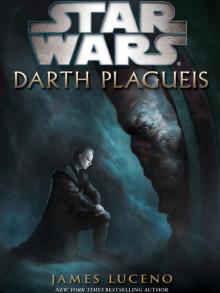 Darth Plagueis
Darth Plagueis Memories End
Memories End Star Wars: Dark Lord: The Rise of Darth Vader
Star Wars: Dark Lord: The Rise of Darth Vader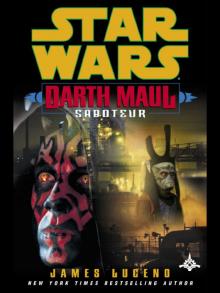 Star Wars Darth Maul: Saboteur
Star Wars Darth Maul: Saboteur Star Wars: Millennium Falcon
Star Wars: Millennium Falcon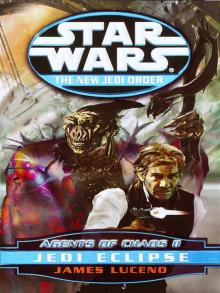 Jedi Eclipse
Jedi Eclipse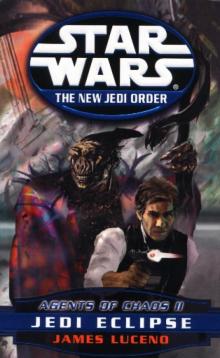 Star Wars The New Jedi Order - Agents of Chaos II - Jedi Eclipse - Book 5
Star Wars The New Jedi Order - Agents of Chaos II - Jedi Eclipse - Book 5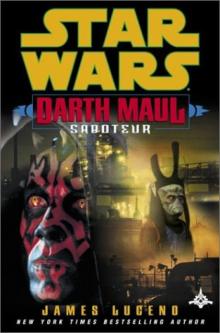 Star Wars - Darth Maul - Saboteur
Star Wars - Darth Maul - Saboteur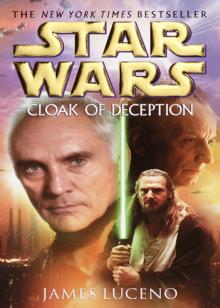 Star Wars: Cloak of Deception
Star Wars: Cloak of Deception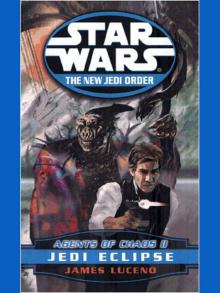 Star Wars: New Jedi Order: Agents of Chaos II: Jedi Eclipse
Star Wars: New Jedi Order: Agents of Chaos II: Jedi Eclipse End Game
End Game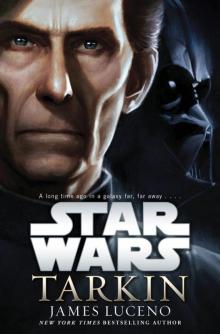 Tarkin: Star Wars
Tarkin: Star Wars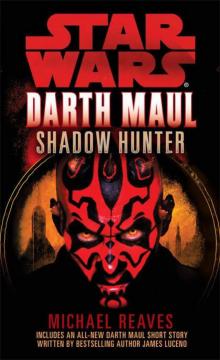 Restraint
Restraint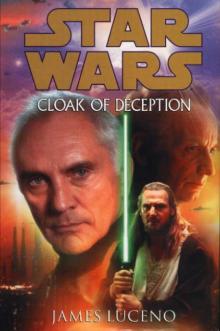 Star Wars - Cloak Of Deception
Star Wars - Cloak Of Deception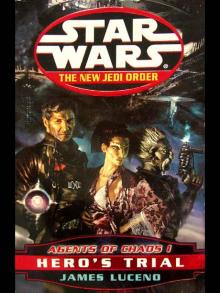 Star Wars: New Jedi Order: Agents of Chaos I: Hero's Trial
Star Wars: New Jedi Order: Agents of Chaos I: Hero's Trial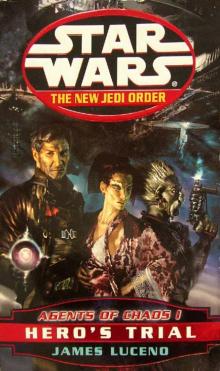 Star Wars The New Jedi Order - Hero's Trial - Book 4
Star Wars The New Jedi Order - Hero's Trial - Book 4 The Essential Novels
The Essential Novels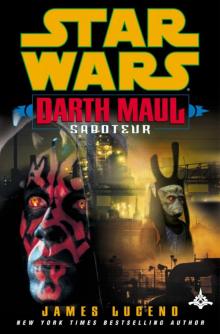 Darth Maul: Saboteur
Darth Maul: Saboteur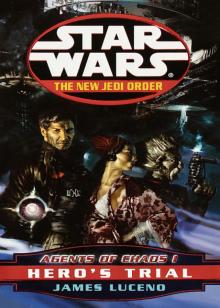 Hero's Trial: Agents of Chaos I
Hero's Trial: Agents of Chaos I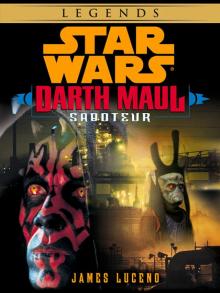 Saboteur
Saboteur The Unifying Force
The Unifying Force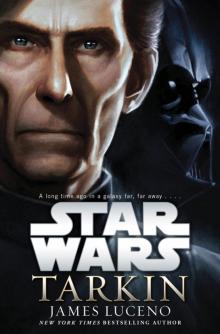 Tarkin
Tarkin Dark Lord : The Rise of Darth Vader
Dark Lord : The Rise of Darth Vader Catalyst
Catalyst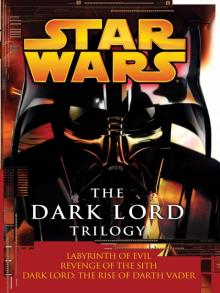 Book 0 - The Dark Lord Trilogy
Book 0 - The Dark Lord Trilogy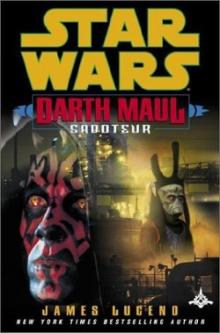 Darth Maul: Saboteur (star wars)
Darth Maul: Saboteur (star wars)